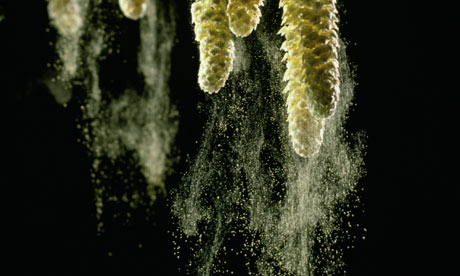
Meadow rye, timothy grass and silver birch: pretty though they might sound, these are among the plants which bring misery to millions during the hay fever season. With 15-20% of the UK population now estimated to be sufferers, hay fever is, like other allergies, becoming more and more common.
When people who are allergic to pollen come into contact with it, the immune system goes into overdrive, producing large amounts of histamine and other powerful chemicals. It is these chemicals which cause those familiar, debilitating symptoms: the constant sneezing, the runny or blocked nose, itchy eyes and throat, and in some unfortunates, a cough or wheeze. Research has found that car exhausts, tobacco smoke or perfume can aggravate these symptoms.
Which months you are affected depends on the type of pollen you are allergic to: the tree pollen season runs from April through May, while levels of grass pollen start to rise in May, peaking in June and July. And finally, weed pollen and mould spores (the seeds of a type of fungus found in damp spots such as compost piles or rotting logs), come into their own in late summer. A skin-prick test, usually carried out in specialist centres (and by some GPs), may be able to detect the type of pollen that is causing your symptoms, although these tests aren't always reliable.
But what truly works to keep the symptoms at bay?
Antihistamine
There's no doubt that antihistamine tablets (or syrup, for those who find swallowing difficult), work well for mild hay fever, calming the body's allergic reaction and improving sleep, concentration and quality of life. While the older antihistamines can cause drowsiness, there is far less chance of this happening with the newer types such as cetirizine (one brand name is Zirtek but the generic versions are often cheaper and just as effective) and loratidine (Clarityn being one brand). You can buy both of these over the counter. There is also an antihistamine nasal spray called azelastine (Rhinolast) available on prescription, which is useful for almost instant relief of symptoms such as a runny or itchy nose; try not to tilt your head back when using it as it can leave a bitter taste in the mouth.
Steroid sprays
Corticosteroid nasal sprays can help relieve a persistently runny or blocked nose; for maximum effect you should start this treatment a fortnight before you expect to get hay fever. Over the counter versions include beclometasone (Beconase) and fluticasone (Flixonase). In some people, steroid sprays can cause mild irritation and nosebleed, and used at high doses for a long time, there is a risk of more serious side-effects; so use the lowest dose that works for you. Children will need a prescription for a steroid spray, or they may be advised to try another type of nasal spray, containing sodium cromoglicate (Rynacrom).
Decongestants and eyedrops
For a blocked nose, you can also try a decongestant spray such as oxymetazoline (Otrivine) but don't use it for longer than a week as doing so can cause further congestion. For itchy or gritty eyes, you can try also try eye drops containing sodium cromoglicate, (Optimcrom Allergy) or antihistamines (Otrivine again).
What your doctor can offer
Occasionally, for very severe symptoms, GPs will prescribe a short course of steroid tablets, although these can have serious side-effects. In some cases, immunotherapy, which involves injections of the substance causing the allergy, is recommended, but this carries a small risk of severe allergic reaction (anaphylaxis) and is only undertaken in specialist centres.
Alternative treatments
These are increasingly popular and include herbal remedies such as nettle leaf, echinacea and elderflower; hypnotherapy; homeopathy; acupuncture; honeycomb, vitamin C and bee pollen supplements. But have any been proven to work? According to the well-respected Desktop Guide to Complementary and Alternative Medicine, which looks closely at the evidence, research on homeopathic treatment for hay fever is encouraging, in particular for galphimia glauca - derived from a tropical shrub of the same name. Also promising is a herbal remedy called butterbur; one study, published in the British Medical Journal in 2002, found it worked as well as antihistamine medicine. Bear in mind that herbal remedies can interact with conventional medicines and supplements can vary in quality.
Minimise pollen exposure
• Check the pollen count in your area - bbc.co.uk/weather/pollen is a good source. If high, stay indoors with the windows closed, or at least away from heavily-planted open spaces. Levels are usually highest in the early morning, after thunderstorms and on windy days.
• Wear wraparound sunglasses.
• Don't mow the grass - and stay inside when it is being mown by someone else.
• Plan holidays to avoid the pollen season. Go to the seaside, or somewhere where the season is earlier.
• If you are out when the pollen count is high, shower and wash your hair once you get home.
• Bring in washing before pollen levels increase at night - or dry washing indoors.
• Try wearing nasal filters (discreet plastic devices worn inside each nostril). There's some evidence that they can reduce hay fever symptoms
• For more information on hay fever visit theguardian.com/lifeandstyle/besttreatments/hay-fever

